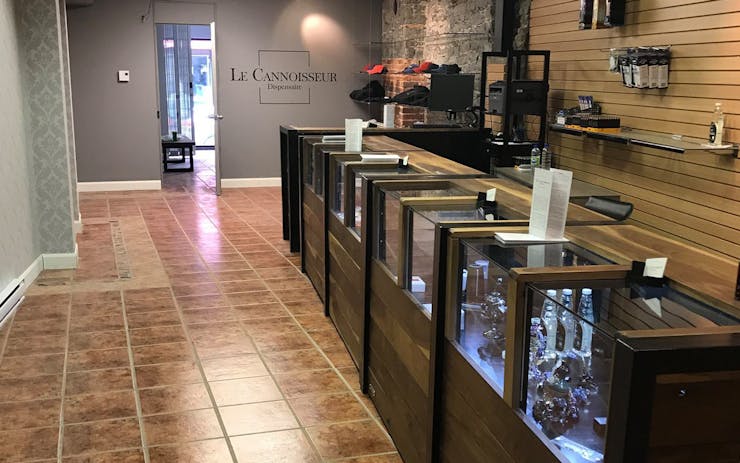Quebec remains quick and punishing in its response to those trying to sell medical cannabis in the province.
In August of 2016, Quebec City police swooped in to close Weeds: Herbes et curiosités, the city’s first medical dispensary, after only two months of operation. In January of this year, Marc Emery, the self-appointed “Prince of Pot,” tried opening five locations of his Cannabis Culture chain in Montreal. They were shut down in two days. Around the same time, Quebec City police shut down “therapeutic dispensary” la Croix-Verte after four months of operation.
“It’s very clear. There will be no sale of cannabis tolerated in our territory so long as the law is as it is presently.”
Quebec police are not forgiving of law-flouting dispensaries. Never mind that cannabis will be recreationally legal in nine months, or that wide use of cannabis in places where it’s been recreationally legalized appears to show no ill social effects. It’s against the law, and the law is the only thing Quebec police care about.
Quebec City’s most recent medical dispensary, Cannoisseur, learned that lesson first-hand when it was raided in early October, after four months in operation in the city’s downtown core. A manager was arrested for trafficking in narcotics.
“This is the third business to be established in Quebec City and is the third business where there has been a raid,” said Constable David Poitras, spokesperson for the Service de Police de la Ville du Québec, in an interview with Radio-Canada. “So in Quebec City, at the level of the police department, it’s zero tolerance for this type of trade.”
Poitras held forth further in an interview with La Presse: “It’s very clear. There will be no sale of cannabis tolerated in our territory so long as the law is as it is presently, which is to say that cannabis is illegal. This was a business that was openly advertised as a dispensary for the sale of cannabis. our investigation showed that no authorization was promulgated by Health Canada and that trade was therefore illegal.”
The members-only dispensary required two pieces of ID, a medication history, and a questionnaire about diagnosis, psychiatric or psychological problems, and personal history with cannabis consumption—all before customers were allowed to pass through a locked door to the room where the cannabis products were kept. Members were required to sign a “terms and conditions” form acknowledging that they understood cannabis was a controlled substance and subject to Canadian federal law, and accepting the risk associated with cannabis possession and consumption. However, a formal medical record was not required.
Marc-Antoine Hamel, one of Cannoisseur’s three owners, told Le Soleil two weeks ago, “We’re going to try not to do what the other stores did, which is to say close. We’ve really organized ourselves with the city, the police, and two law firms so that we stay open. It’s complicated, but we’ve agreed to ensure that we respect the law.”
Unlike Weeds: Herbes et curiosités, Cannoisseur took pains not to show the available cannabis products to non-members. “We didn’t want to do like Weeds, where you came in and you could see the products, that’s illegal,” Hamel told Le Soleil, adding that la Croix-Verte was shut down for not following the law as well, so Cannoisseur’s goal was to work with criminal lawyers in order to make sure they did things right.
Hamel claimed that Cannoisseur’s owners respected the law and had no wish to break it. “We are fully prepared to work with municipal and police authorities to ensure no one can doubt the legality and legitimacy of our business approach,” he said.
Quebec’s medical cannabis is the most tightly regulated in the country, requiring doctors first to prescribe aggressive synthetic cannabinoids.
However, Cyndi Paré, spokesperson for Quebec police, said at the time that the police force made no agreement with any “marijuana dispensary.” She added that all production, distribution, and sale of cannabis remained illegal unless accredited by Health Canada. “A single producer in Quebec, Hyropothecary de Gatineau, has so far received Health Canada accreditation,” Paré said.
Quebec’s medical cannabis is the most tightly regulated in the country, requiring doctors first to prescribe aggressive synthetic cannabinoids, and then to perform a complete medical assessment on any patient who finds their needs are not met by pharmaceutical synthetics. The guidelines for prescribing cannabis from the Collège des médecins du Québec (Quebec College of Physicians) note that “[t]he use of cannabis for medical purposes is not a recognized treatment” and “an unrecognized treatment can only be used within a research framework.”
Upon receiving a prescription for medical cannabis, patients are also put onto the Quebec Cannabis Registry and their user-data is contributed to medical research by the Research Institute of the McGill University Health Centre and the Canadian Consortium for the Investigation of Cannabinoids. The Registry is mandatory: Patients cannot opt out.
Shop highly rated dispensaries near you
Showing you dispensaries nearIn a post two hours after the raid, the Cannoisseur Facebook page shared an article about the raid with the heading, “On break for the day.” A follow up comment from the page owners read, “Police gonna police! We back soon.”





